Introduction
Rabbits are delightful companions, known for their gentle nature and adorable appearance. However, to keep them healthy and happy, it’s crucial to understand their dietary needs.
Knowing “what can rabbits eat” is the first step in providing a balanced diet that supports their overall well-being. In this comprehensive guide, you’ll discover safe and healthy food options for your bunny, along with tips on portion control, suitable treats, and foods to avoid.
Let’s dive into the essentials of a rabbit’s diet and learn how to keep your furry friend thriving.
What Can Rabbits Eat?
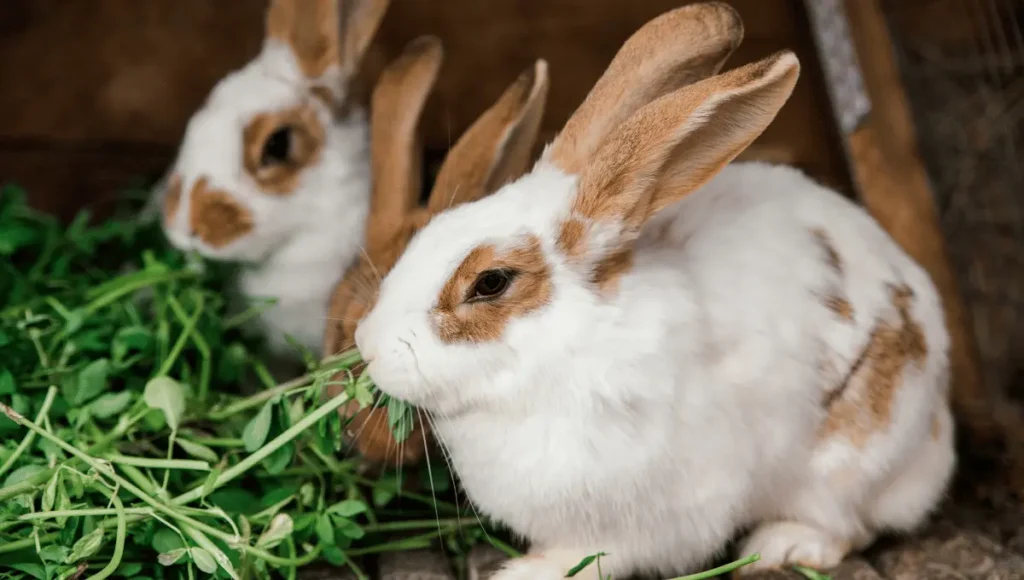
A rabbit’s diet should primarily consist of hay, fresh vegetables, and water, with pellets and treats making up a smaller portion.
Hay, specifically Timothy or Meadow hay, is the cornerstone of their diet as it provides essential fiber, aiding in digestion and dental health.
Fresh vegetables such as leafy greens are vital for providing vitamins and minerals, while a small amount of high-quality pellets ensures they receive additional nutrients.
Treats, including fruits and herbs, can be given in moderation but should not form the bulk of their diet.
When introducing any new food, it’s important to do so gradually to avoid digestive upset. Introduce new foods gradually, keeping a close eye on how your rabbit responds.
If they produce soft stools or show signs of discomfort, remove the new food and wait before trying something else. Always ensure that the foods are washed and free from pesticides or chemicals before feeding them to your rabbit.
How Much Does a Rabbit Eat?
Managing portion sizes is crucial when feeding rabbits. Overfeeding can lead to obesity and other health issues, while underfeeding may cause malnutrition. Typically, an adult rabbit should consume on average:
- Unlimited hay: This should be available at all times.
- Fresh vegetables: About 1 cup per 2 pounds of body weight daily.
- Pellets: 1/4 cup per 5 pounds of body weight daily.
- Freshwater: Always accessible and refreshed daily.
Rabbits tend to be creatures of habit, so feeding them at the same time each day can help regulate their digestive system. Adjust the portion sizes based on your rabbit’s weight, age, and health condition.
Young, growing rabbits, for instance, may require more nutrients and can be fed alfalfa hay in addition to their regular diet.
The Best Foods for a Rabbit
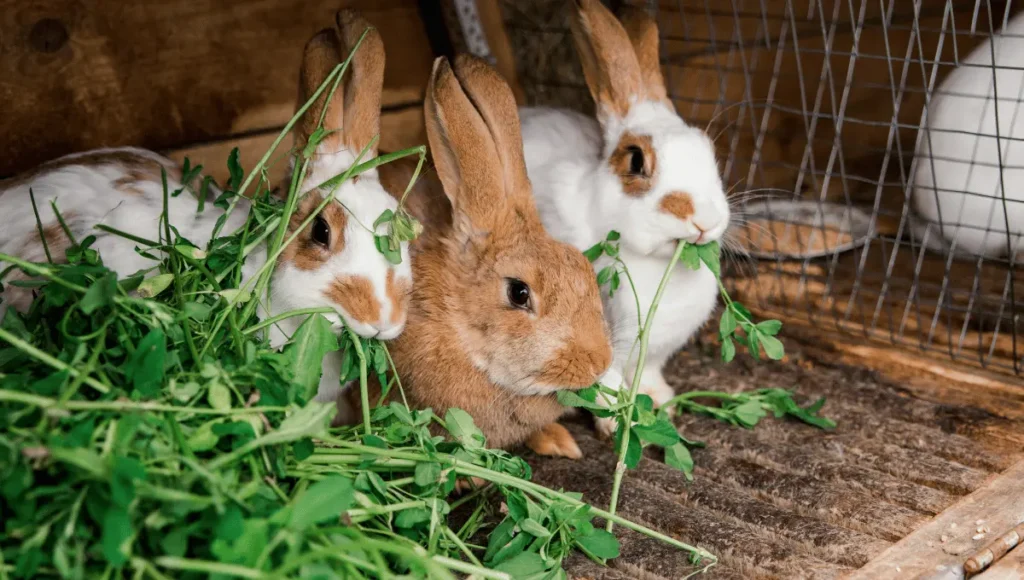
Feeding your rabbit the right foods ensures they receive the necessary nutrients for a healthy life. The best foods for rabbits include:
- Hay: Timothy, Meadow, or Orchard hay should be the primary component of their diet. It provides essential fiber that aids in digestion and keeps their teeth in check.
- Leafy Greens: Kale, spinach, and romaine lettuce are excellent choices. They provide vital vitamins like A and K.
- Herbs: Parsley, basil, and cilantro are flavorful options that are also beneficial.
- Pellets: High-quality, hay-based pellets offer a concentrated source of vitamins and minerals. They should be given in moderation.
Daily Diet Recommendations for Rabbits
| Food Type | Amount | Frequency |
| Hay | Unlimited | Daily |
| Fresh Vegetables | 1 cup per 2 lbs of body weight | Daily |
| Pellets | 1/4 cup per 5 lbs of body weight | Daily |
| Fresh Water | Unlimited | Daily |
| Fruits & Treats | 1-2 tablespoons | Occasionally |
Which Vegetables Can Rabbits Eat?
Vegetables are an essential part of a rabbit’s diet, offering a variety of nutrients that contribute to their health. However, not all vegetables are safe for rabbits, and it’s important to know which ones to include.
- Leafy Greens: Safe options include romaine lettuce, kale, spinach, and arugula. These should be given in combination to provide a range of nutrients.
- Root Vegetables: Carrots and radishes can be given in moderation, but be cautious as they are high in sugar.
- Other Vegetables: Bell peppers, zucchini, and cucumbers are great choices that add variety and nutrients to their diet.
Always introduce new vegetables slowly and one at a time to monitor your rabbit’s tolerance. Avoid feeding vegetables like iceberg lettuce and cabbage, which can cause digestive issues.
Can Rabbits Eat Cucumbers?
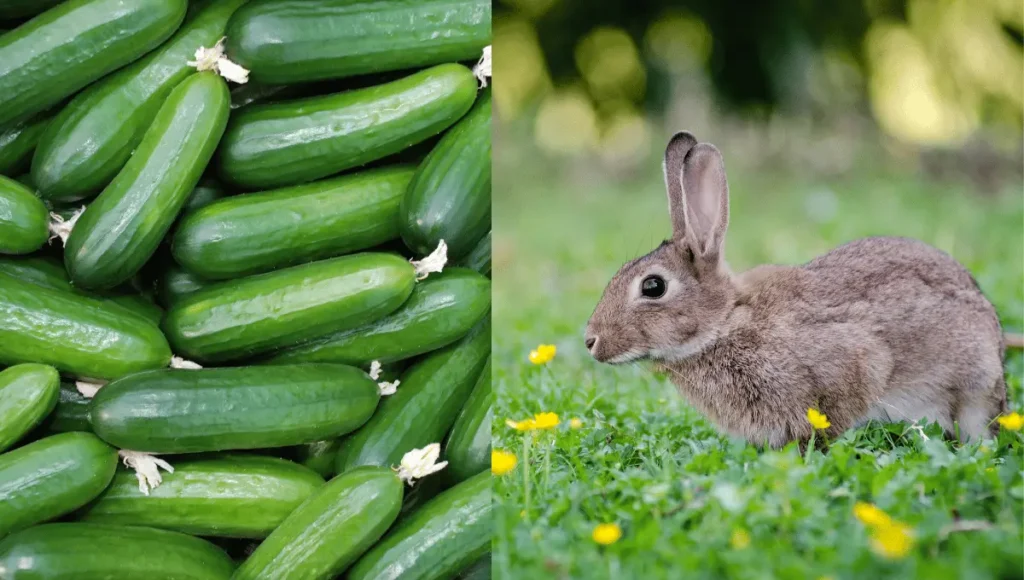
Yes, rabbits can eat cucumbers! In fact, cucumbers are a safe and refreshing treat for most rabbits. They are made up of about 95% water, which makes them a great way to help keep your bunny hydrated, especially on hot days. Cucumbers are also low in calories, which means they won’t contribute to weight gain if given in moderation.
Can Rabbits Eat Beets?
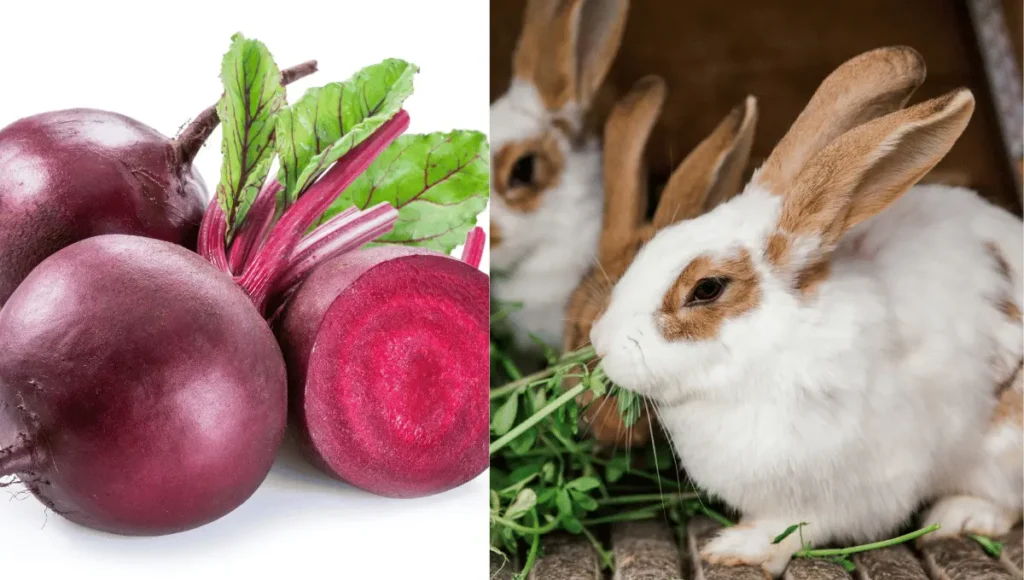
Yes, rabbits can eat beets, but only in moderation. Beets, including the root and the leaves, are safe for rabbits to consume, but they should be given sparingly due to their high sugar content. While beet greens are a healthier option, rich in vitamins and minerals, beetroot should be limited to small amounts as an occasional treat.
Overfeeding beets can lead to digestive issues and obesity in rabbits. Therefore, it’s best to offer beets as a supplement to their regular diet of hay, fresh water, and leafy greens, ensuring a balanced and healthy diet for your rabbit.
Which Fruits Can Rabbits Eat?
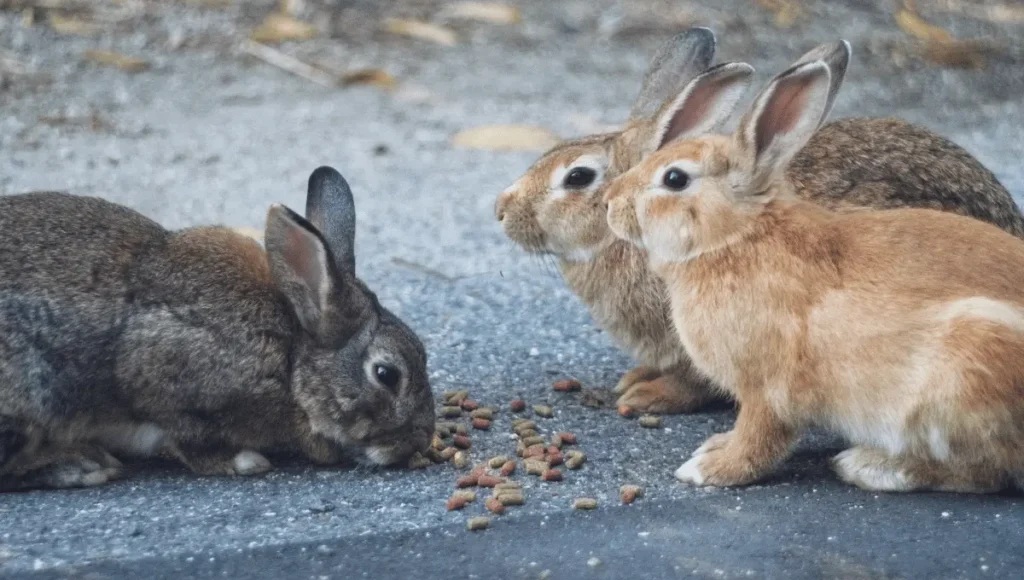
Fruits should be treated as a special treat rather than a regular part of a rabbit’s diet due to their high sugar content. When given in moderation, fruits can be a delightful and nutritious snack for your rabbit.
- Safe Fruits: Apples (without seeds), strawberries, blueberries, and pears are popular choices. These fruits are rich in vitamins but should be given sparingly.
- Moderation is Key: Limit fruit intake to 1-2 tablespoons per day for an average-sized rabbit. Too much fruit can lead to obesity and digestive issues.
When offering fruits, ensure they are fresh, washed, and cut into small, manageable pieces. Remove any seeds or pits that could be harmful to your rabbit.
Safe Herbs for Bunnies
Herbs can add flavor and variety to your rabbit’s diet while providing additional health benefits. Many herbs are safe for rabbits and can be given regularly.
- Common Herbs: Parsley, cilantro, dill, and mint are safe and nutritious for rabbits.
- Health Benefits: Herbs like parsley are rich in vitamin C, while mint can have a calming effect on rabbits.
Offer herbs in small amounts as part of their daily vegetable intake. Rotate different herbs to provide a range of nutrients and flavors.
Wild Garden Herbs, Weeds, and Flowers That Rabbits Can Eat
Rabbits can enjoy a variety of wild garden herbs, weeds, and flowers, which can be a natural and beneficial addition to their diet.
- Edible Weeds: Dandelion leaves, clover, and plantain are safe and nutritious for rabbits.
- Safe Flowers: Marigolds, nasturtium, and pansies are not only edible but also provide a colorful treat for your bunny.
Ensure that any wild plants you offer are free from pesticides and have not been contaminated by pollutants. It’s best to collect these from your own garden or a trusted source.
Foods to Feed Your Rabbit as a Treat
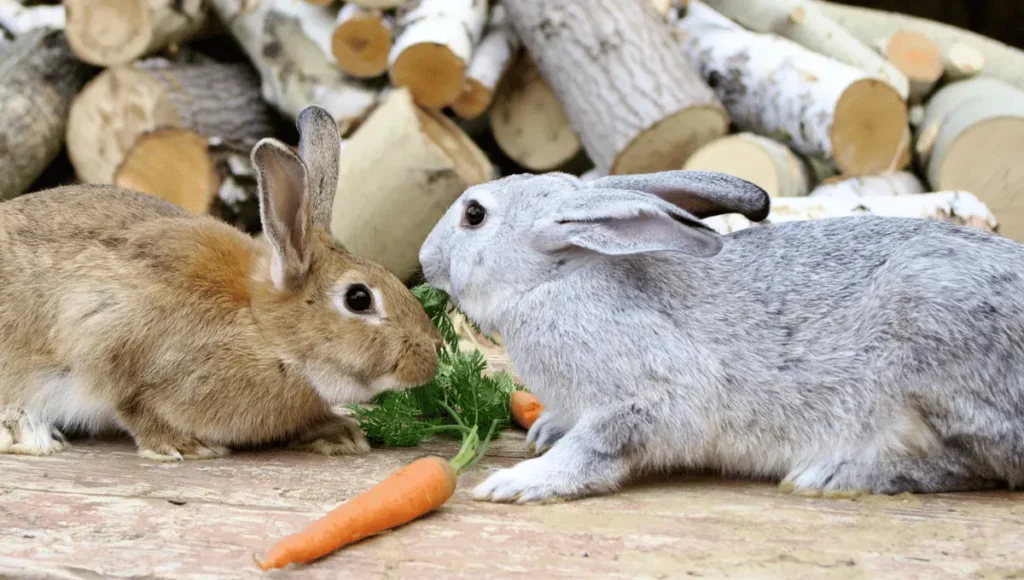
Treats should be given sparingly and should complement a rabbit’s main diet. The best treats are those that provide some nutritional benefit without overwhelming their system with sugar or fat.
- Healthy Treats: Small pieces of apple, carrot, or a few blueberries can be a delightful treat for your rabbit.
- Store-bought Treats: Opt for natural, hay-based treats without added sugars or artificial ingredients.
Remember, treats should not exceed 5% of your rabbit’s daily food intake. Offering treats during training or as a reward can strengthen the bond between you and your rabbit.
Foods You Should Never Feed Your Rabbit
While there are many foods that rabbits can safely enjoy, there are also several that should be strictly avoided due to their potential harm.
- Dangerous Foods: Chocolate, avocados, onions, and garlic are toxic to rabbits and should never be fed to them.
- Foods to Avoid: Iceberg lettuce, potatoes, and rhubarb can cause severe digestive issues and should be kept out of their diet.
If you’re ever in doubt about whether a food is safe, it’s best to err on the side of caution and avoid giving it to your rabbit. Always consult with a veterinarian if you’re unsure.
Conclusion
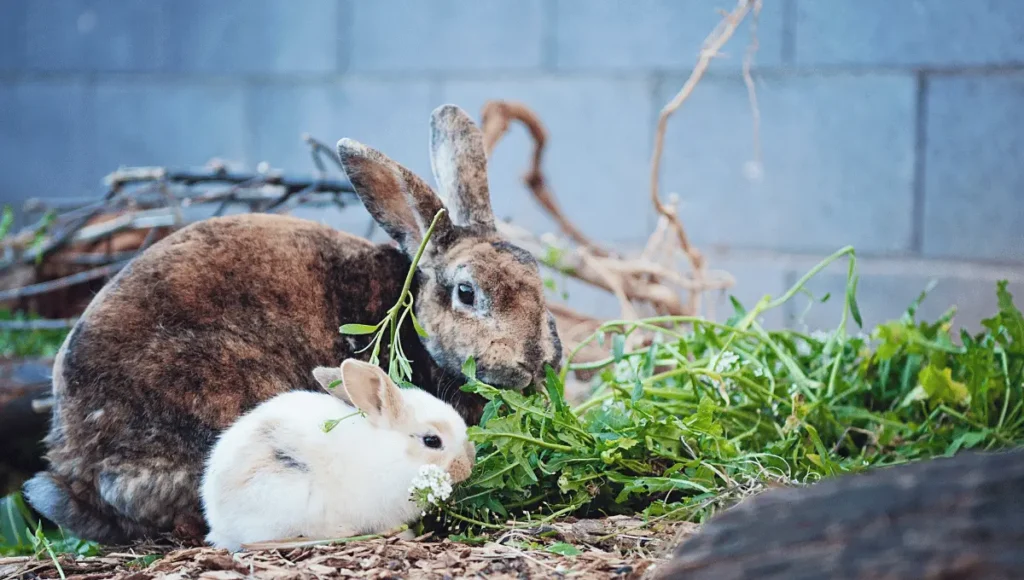
Feeding your rabbit a balanced and varied diet is essential for their health and happiness. By understanding what rabbits can eat, including the best vegetables, fruits, and herbs, and avoiding harmful foods, you can ensure your bunny thrives.
Always monitor their reaction to new foods and adjust their diet as needed to maintain their well-being. A healthy rabbit is a happy rabbit, and with the right care, your furry friend will lead a long, contented life.
FAQs
What is the most important food for a rabbit’s diet?
The most important food for a rabbit’s diet is hay, specifically Timothy or Meadow hay. It should make up the majority of their diet as it provides essential fiber for digestion and helps keep their teeth healthy.
Can rabbits eat fruits and vegetables every day?
Yes, rabbits can eat vegetables every day, but fruits should be given sparingly as a treat due to their high sugar content. Vegetables like leafy greens should be a regular part of their diet, while fruits should be limited to 1-2 tablespoons per day.
Are there any foods that are dangerous for rabbits?
Yes, certain foods are toxic to rabbits and should be avoided entirely. These include chocolate, avocados, onions, garlic, and rhubarb. Additionally, foods like iceberg lettuce and potatoes can cause digestive problems and should not be fed to rabbits.
How much should I feed my rabbit daily?
A rabbit should have unlimited access to hay, about 1 cup of fresh vegetables per 2 pounds of body weight, and a small amount of pellets (1/4 cup per 5 pounds of body weight). Fresh water should always be available.
Can rabbits eat wild plants from my garden?
Some wild plants, like dandelion leaves, clover, and certain flowers, are safe for rabbits to eat. However, it’s important to ensure that these plants are free from pesticides and pollutants. Always research or consult a veterinarian before feeding wild plants to your rabbit.

Pingback: Can Rabbits Eat Cucumbers? Benefits and Risks Explained - Farm Pets
Pingback: Can Rabbits Eat Beets? A Guide to Safe Rabbit Diets
Pingback: Do Rabbits Eat Mice? What You Need to Know - Farm Pets
Pingback: Can Rabbits Eat Watermelon? A Safe Feeding Guide - Farm Pets
Pingback: Can Rabbits Eat Tomatoes? A Complete Guide for Owners
Pingback: Can Rabbits Eat Kale? Benefits and Risks Explained